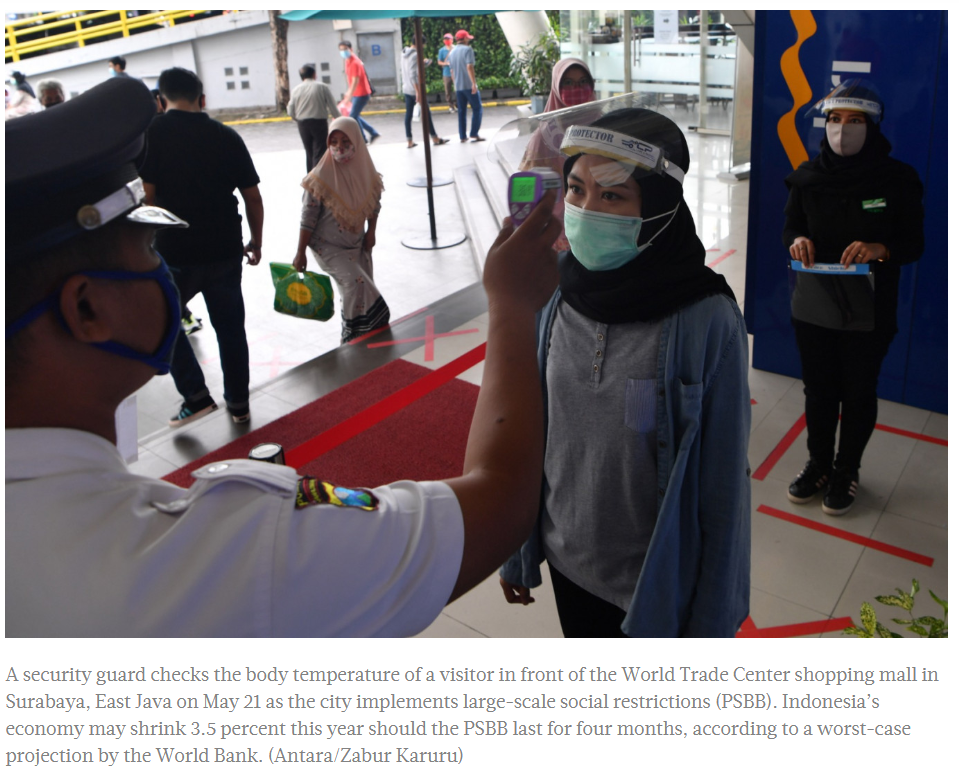Indonesia’s economy may shrink 3.5% if PSBB last for 4 months: World Bank
Indonesia’s economy may shrink 3.5 percent this year should the large-scale social restrictions (PSBB) imposed by several regional administrations nationwide last for four months, according to a worst-case projection by the World Bank, as the government rushes to reopen the virus-battered economy.
Under its baseline scenario, however, Indonesia’s economy is expected to grow zero percent compared to 5.02 percent last year, said World Bank senior economist for Indonesia Ralph van Doorn on Tuesday.
“This [the baseline scenario] assumes two months of large-scale social restrictions and takes into account a severe global economic slowdown and a very big drop in commodity prices, all of which will have an effect on Indonesia’s economy,” van Doorn told reporters in a livestreamed news conference.
“We expect private consumption to slow down due to job losses and a decline in consumer confidence,” said van Doorn. “We also expect a slowdown in investment growth because of weaker economic activity and lower commodity prices.”
Indonesia’s economy grew 2.97 percent in the first quarter, the weakest since 2001, while household consumption expanded just 2.84 percent year-on-year (yoy) from 5.01 percent during the same period last year. The government’s worst-case scenario sees the economy contracting 0.4 percent this year.
Fitch Solutions in its research on May 6 projected private consumption to contract 1.5 percent in 2020 and the economy to shrink 1.3 percent.
Four provinces and 11 regencies/cities nationwide had implemented PSBB as of Tuesday afternoon since Indonesia’s outbreak epicenter Jakarta started applying the measure on April 10, forcing offices, factories and retail shops to close and limiting people’s movement. The coronavirus has infected more than 27,500 people and killed at least 1,660 in Indonesia, official data show.
The government is now pushing ahead to reopen the economy to prevent further weakening by easing restrictions in areas where infection rates are under control, allowing malls and restaurants to reopen with strict health protocols, despite a surge in coronavirus infections nationwide.
The Finance Ministry’s Fiscal Policy Agency director for macroeconomic policy Hidayat Amir said the government’s decision to reopen the economy was aimed at preventing massive bankruptcy and speeding up the economic recovery process after the threat had subsided.
“Economic recovery may take place in the third and fourth quarters,” said Hidayat at the same news conference. “We want businesses to survive and prevent massive job losses.”
Finance Minister Sri Mulyani Indrawati recently projected that 1.89 million to 4.89 million Indonesians would become poor as a result of the pandemic, while 3 million to 5.23 million would lose their jobs.
On Tuesday, Van Doorn of the World Bank expected the country’s poverty rate to surge by 2.1 to 3.6 percentage points, which would mean between 5.6 million and 9.6 million people falling into poverty this year.
“There is a need for adequate protection for vulnerable communities,” Van Doorn said. “We are concerned that the value of the stimulus package may not be enough to offset the economic impact on households.”
The government is rolling out a Rp 641.17 trillion (US$44.3 billion) economic recovery stimulus package to strengthen its safety net programs, as well as to provide cash injections to state-owned enterprises and subsidized loan interest for micro, small and medium enterprises (MSMEs), among other things.
As much as Rp 149.29 trillion of the fund will be used for bailouts for 12 SOEs, mostly as cash compensation and working capital investments, to reduce the impact of the virus crisis. The funding includes Rp 48 trillion in compensation for electricity firm PLN, Rp 45 trillion in compensation for oil company Pertamina and Rp 8.5 trillion in working capital guarantee for flag carrier Garuda Indonesia.
The government will also provide Rp 34.15 trillion in loan repayment subsidies to around 60 million borrowers, while Rp 87.59 trillion will be allocated to banks to support their loan-restructuring programs.
It is also planning to provide Rp 172.1 trillion for the social safety net, far higher than the previous plan of Rp 110 trillion, as well as increasing its tax incentives program to Rp 123 trillion from the initial plan of Rp 70.1 trillion.
“The government will accelerate spending to help MSMEs and SOEs, apart from a consumer spending stimulus and tax incentives for industry,” Sri Mulyani said in May. “These efforts aim to stimulate the supply and demand sides for economic recovery.”
Source: https://www.thejakartapost.com/news/2020/06/02/indonesias-economy-may-shrink-3-5-if-psbb-last-for-4-months-world-bank.html


 English
English




